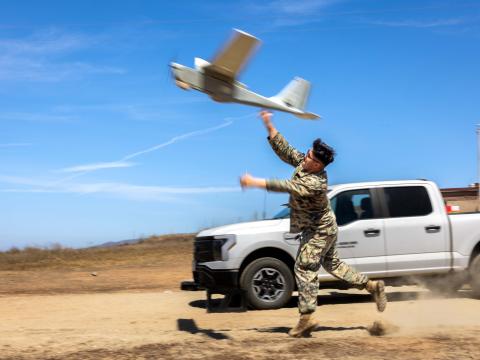IEDs: Not Just for Terrorists Anymore
Leading IED Specialist Calls for Faster Counter-IED Solutions and International Information Sharing Lt. Gen. Michael L. Oates, USA, director of the Joint improvised explosive devices (IEDs) office, kicked off the 2010 Joint Warfighting Conference calling for improvements in ability to share information with coalition partners, quickening the acquisition cycle and increasing troop training. Secretary of Defense Bill Gates' vision of the future recognizes the IED threat, but the QDR has very little about IEDs in it, Gen. Oates stated. "Today, the IED is a condition of our work place. Warfighters have got to be able to operate in these conditions. Although they [IEDs] can be very rudimentary, they are changing the way our commanders must operate," the general said. Gen. Oates predicted that IEDs will find their way into civilized situations more often as evidenced by the recent events in New York City. They will be used not only by terrorists but also by the criminal, drug and illegal finance trades. The military will find that the technology of these devices is more difficult to defeat and more will be seen in the southern hemisphere, he added. "If we assume that IEDs will continue to be used, we have to be able to train and equip our warfighters to deal with them. Also we need to break down the barriers that stop the United States from sharing information with coalition partners," Gen. Oates noted. The general also emphasized that the U.S. Defense Department must find a way to improve the acquisition process. "It cannot be business as usual. ... I do not want to be the billionth person this month to say that the acquisition process needs changing, but if it needs to be fixed, let's fix it," he stated. "This is not an engineering problem. It is not intelligence problem. It is a commander's problem because information cannot be shared. "We have got to find a way for tactical commanders to share information rapidly and thoroughly," the general added. We need to ensure that we have a common taxonomy across the joint forces. Work on this has begun. At the tactical level, there are important questions about how to organize to fight these. At beginning of war, had six people to fight this; we still have six people, but we now have to add different types of skill sets. The military must look at what it is currently using in theater, what it needs, and how we it is organized for battle. There is a severe need for technologies in biometrics, forensics and tactical weapons. "These technologies are a priority for me," Gen. Oates stated.




Comments